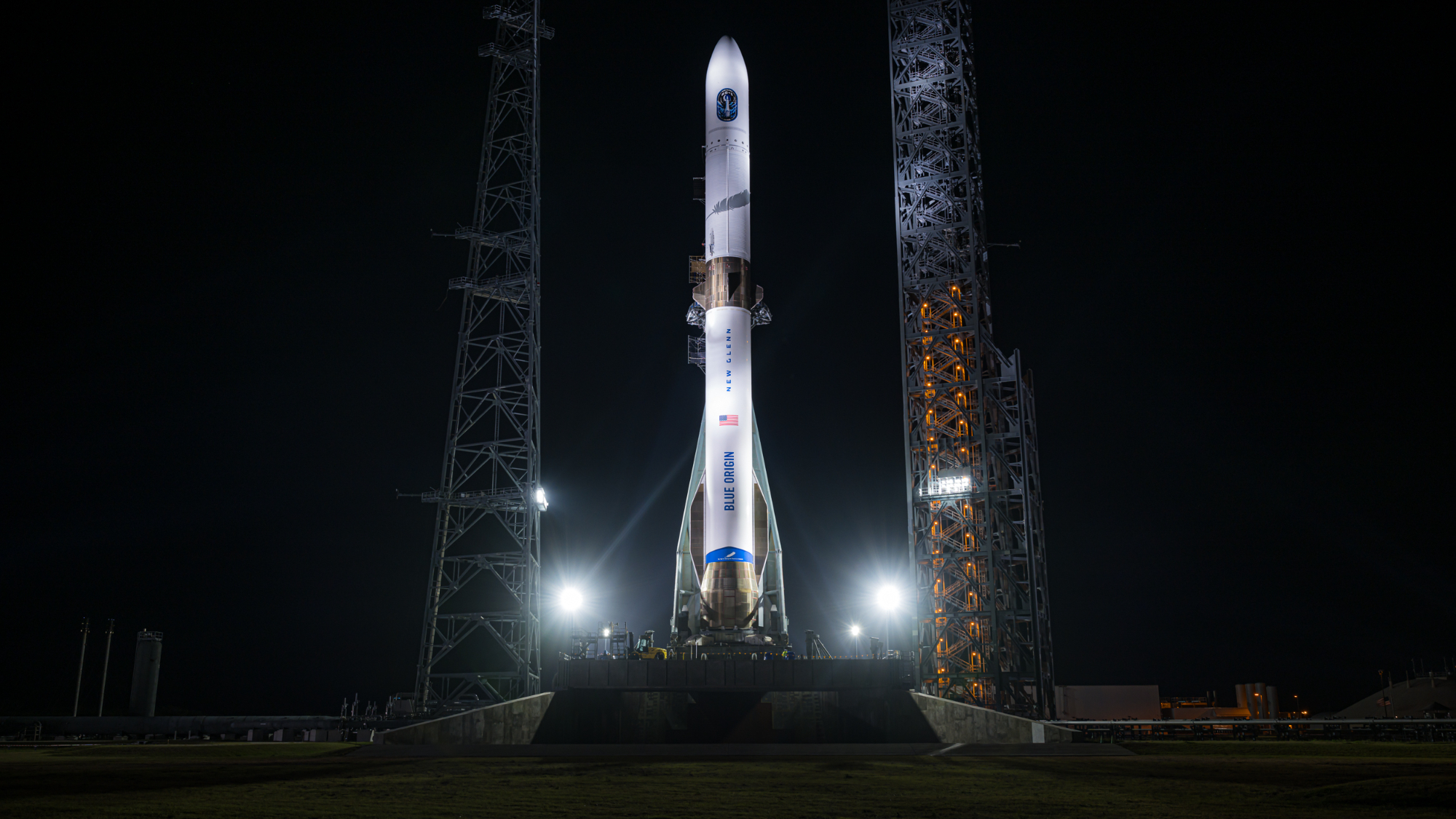
We'll have to wait a little longer to see Blue Origin's New Glenn rocket lift off for the first time.
Blue Origin, the aerospace company founded by billionaire Jeff Bezos, aimed to launch its first New Glenn heavy-lift rocket from Florida's Space Coast this morning (Jan. 13), during a three-hour window that opened at 1 a.m. EST (0600 GMT).
Blue Origin pushed the planned launch time back multiple times before finally calling the attempt off at around 3:10 a.m. EST (0810 GMT).
"We’re standing down on today’s launch attempt to troubleshoot a vehicle subsystem issue that will take us beyond our launch window. We’re reviewing opportunities for our next launch attempt," the company announced via X.
That post did not identify the subsystem or the issue, and neither did the hosts of the company's launch webcast.
Related: Blue Origin: Everything you need to know about the private spaceflight company
On Monday evening, the company revealed the cause of the scrub to be "ice forming in a purge line on an auxiliary power unit that powers some of our hydraulic systems." That X post with that news also announced a new launch target: Tuesday morning (Jan. 14), during a three-hour window that opens at 1 a.m. EST (0600 GMT). A few hours later on Monday, however, Blue Origin pushed the try back to Thursday morning (Jan. 16), during that same window.
Breaking space news, the latest updates on rocket launches, skywatching events and more!
This isn't the first launch delay for the 320-foot-tall (98 meters) New Glenn, which features a reusable first stage.
Blue Origin originally aimed to fly this debut mission, which it calls NG-1, on Friday (Jan. 10) but pushed the try back 72 hours due to rough seas in the patch of the Atlantic Ocean where the rocket's first stage is expected to land. (If all goes according to plan, that touchdown will occur on a ship nicknamed Jacklyn, after Bezos' mother.)
Blue Origin has a few days to address the issue; the current NG-1 launch window runs through Jan. 16. The test flight will launch a pathfinder version of Blue Ring, a new spacecraft platform the company has built.
New Glenn, which has been in development for about a decade, is Blue Origin's first orbital-class rocket. The company already flies a reusable suborbital vehicle called New Shepard, which takes people and payloads on brief trips to space.
Editor's note: This story was updated at 7:25 p.m. ET on Jan. 13 with the cause of that day's launch scrub and the new target date of Jan. 14, then again at 9:54 p.m. ET with the new target date of Jan. 16.
Join our Space Forums to keep talking space on the latest missions, night sky and more! And if you have a news tip, correction or comment, let us know at: community@space.com.

Michael Wall is a Senior Space Writer with Space.com and joined the team in 2010. He primarily covers exoplanets, spaceflight and military space, but has been known to dabble in the space art beat. His book about the search for alien life, "Out There," was published on Nov. 13, 2018. Before becoming a science writer, Michael worked as a herpetologist and wildlife biologist. He has a Ph.D. in evolutionary biology from the University of Sydney, Australia, a bachelor's degree from the University of Arizona, and a graduate certificate in science writing from the University of California, Santa Cruz. To find out what his latest project is, you can follow Michael on Twitter.
-
Unclear Engineer I seriously doubt that the professionals involved in either of these launch projects have such an adolescent, egocentric approach to their work as Ryan's post claims.Reply
Neither of the very public egos at the tops of these development corporations makes the actual launch decisions. And I seriously doubt they would pressure the professionals to "just launch the damn rockets, already".
The real goal is a successful launch vehicle that can be used profitably. Uselessly blowing up a test vehicle so that it fails to achieve its test objectives just to get off the pad first would be too stupid to allow.
But, certainly, nobody can credibly accuse Musk of being unwilling to take calculated risks to speed up the SpaceX development process. -
BCME Was it just me or were the two gals doing the announcing more vacuous than space. I mean I know they are just supposed to be talking heads but they were painful to listen to.Reply
I am so excited to see other players entering the field and New Glen is a giant step forward for them. I hope it lifts and lands as intended just like I hope starship 7 goes well...can hardly wait for the day when we have people living "up there" and not just ISS but the moon, mars and beyond.
I just wish that these companies could hire people that are a bit more knowledgeable to speak for them -
ChrisA Reply
Yes, the coverage was just "filler fluff" to occupy the time. I "watched" but had the sound turned off and most of the window covered and did "real work" while the countdown timer ran.BCME said:Was it just me or were the two gals doing the announcing more vacuous than space. I mean I know they are just supposed to be talking heads but they were painful to listen to....
They should be embarrassed at the kindergarten-level drivel. Maybe next time they can hire someone with specialist knowledge who can listen in to what is happening and explain it. -
Classical Motion Watching on mute here too. When they reset that clock for the third time I left.Reply -
fj.torres Reply
Musk can afford it.Unclear Engineer said:I seriously doubt that the professionals involved in either of these launch projects have such an adolescent, egocentric approach to their work as Ryan's post claims.
Neither of the very public egos at the tops of these development corporations makes the actual launch decisions. And I seriously doubt they would pressure the professionals to "just launch the damn rockets, already".
The real goal is a successful launch vehicle that can be used profitably. Uselessly blowing up a test vehicle so that it fails to achieve its test objectives just to get off the pad first would be too stupid to allow.
But, certainly, nobody can credibly accuse Musk of being unwilling to take calculated risks to speed up the SpaceX development process.
His rocket is designed to be cheap and fast to produce. And he has four in the pipeline waiting to go. If he "wastes" a rocket the experience and data is worth more than the few million it costs. That is what makes his calculated risks pay off.
Blue Origin reportedly took over 7 months to assemble NG-1. Losing it might mean a whole year delay vs 4-6 weeks for Starship. Caution is mandatory when you're purposefully slow.
I don't doubt the launch will be mostly successful when it is finally cleared to go but the economics of their system are questionable. Especially if they've been running a burn rate of a billion a year. Those are NASA cost-plus numbers and even NASA is moving away from that in the post CST-100 era. Making it fly is going to be the easy part.
